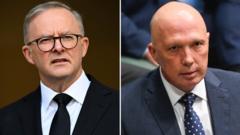With the announcement of the federal election set for May 3, Prime Minister Anthony Albanese and Liberal leader Peter Dutton gear up for a competitive campaign amidst economic pressures and critical voter issues.
Australia's Federal Election Date Set for May 3

Australia's Federal Election Date Set for May 3
Australians prepare for a key federal election focused on cost-of-living challenges.
Australia is gearing up for a pivotal federal election scheduled on May 3, where Prime Minister Anthony Albanese's Labor Party will face off against Peter Dutton of the Liberal Party. This election could mark a significant moment in Australian politics, with predictions of a closely contested outcome. Albanese announced the date during a speech from Parliament House, emphasizing the importance of voter choice at this crucial juncture.
Polling data indicates a tight race between the two major parties, suggesting the likelihood of cooperation with independent MPs or smaller parties that gained a substantial share of the vote in the previous election. The crux of the campaign is heavily centered on addressing rising living costs, with Labor striving to avoid being the first single-term government to lose re-election in nearly a century.
In a press conference following the announcement, Albanese reiterated his commitment to tackling cost-of-living challenges through enhanced public healthcare, reduced student debts, and targeted tax alleviations. He criticized Dutton's potential leadership as a regression, linking it to the previous government's failures. "It was always going to take more than three years to clean up 10 years of mess," he remarked, urging voters to choose a future defined by hope rather than fear.
Conversely, Dutton argued that Australia cannot endure another term under a Labor government, criticizing their decisions that have led to financial strain for many citizens. He promotes a platform aimed at fiscal responsibility, slashing unnecessary government expenditures, revamping public service staffing, curbing immigration, and lowering energy costs.
The Greens, buoyed by a record number of seats in the last parliamentary term, are advocating for their role in holding the major parties accountable, especially regarding environmental policies and affordable housing. Their leader, Adam Bandt, has also indicated that the current political landscape suggests a shift toward minority governance.
Amidst all this, voters remain primarily focused on the affordability of housing and food, access to healthcare, and the pressing issues of immigration and crime management. Climate change discourse continues to resonate strongly with an electorate that has seen political turmoil with frequent leadership changes.
Albanese ascended to power after a tumultuous period marked by political instability and has been proactive in addressing climate policies. However, a failed referendum on constitutional recognition for Indigenous Australians has added to growing criticism. Facing global economic challenges that have intensified cost-of-living issues, Albanese must navigate these headwinds to secure a second term.
Dutton, with over two decades in parliament and experience in pivotal ministerial roles, is presenting himself as a champion for traditional values while attempting to soften his public perception. This election holds immense potential for redefining Australia's political landscape as voters weigh their options between contrasting visions for the future.





















